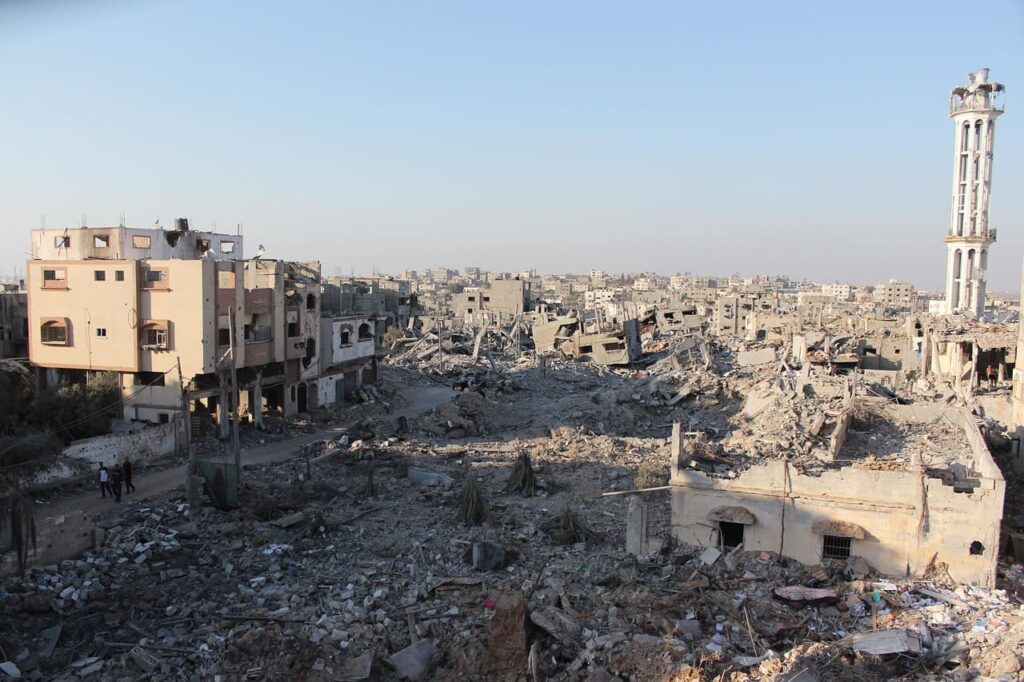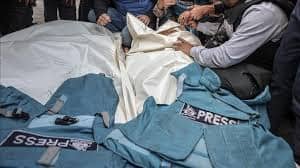In a tragic and alarming twist of events at the Gaza conflict, five journalists from Al Jazeera were murdered in an Israeli airstrike in Gaza City. The incident has sent shockwaves across the world community and raised grave concerns about the safety of journalists and freedom of the press during war.
The Deadly Airstrike
The assault took place when an Israeli missile struck a building which houses Al Jazeera’s media offices in Gaza City, and five staff members who were working on the premises died. Names of the journalists and job were confirmed by Al Jazeera, who described them as dedicated reporters and technicians hard at work reporting on the conflict from the field.
Eyewitnesses who were at the scene testified of horrific images of destruction and chaos, with the building lying in ruin and blazes erupting subsequently. Rescue teams hurried to pull out survivors from the debris, but alas, five of the media personnel were pronounced dead. Several others were badly injured.

Neighbors described images of chaos and fear as the airstrike swept through the usually busy neighborhood. Gunfire and the collapse of concrete echoed in streets, with ambulances speeding to the scene.
Al Jazeera’s Response and International Protest
Al Jazeera management immediately condemned the attack as a “deliberate assassination” of its reporters and media equipment. In an official statement, the network condemned an immediate halt to attacks on media organizations and called for a complete investigation into the attack.
The brutal act of violence against our team is a horrifying violation of international humanitarian law and an attack on freedom of the press worldwide,” the statement said. “We grieve the loss of our friends and call on the international community to hold those responsible accountable.”.
The assaults on reporters who are unbiased witnesses to the realities of war have sparked outrage at home and abroad from human rights campaigners and freedom of information advocates. The Committee to Protect Journalists (CPJ) called the slayings “an unacceptable attack on the free press,” calling on all combatants to take steps to protect journalists.
Reporters Without Borders (RSF) also agreed with the same feelings, adding that journalists should never be seen as soldiers or targets in war-torn areas. “The deliberate targeting of journalists erodes the right to information and transparency, which are essential during war,” RSF stated.
Israel’s Military Justification and Response
The Israeli army has not officially stated that the offices of Al Jazeera were targeted specifically, but defended the raid as being part of its general campaign against Hamas fighters within Gaza. Israeli authorities have asserted that their actions are aimed at defusing threats posed by armed elements, and that civilian losses, including journalists, are regrettable collateral damage within the city war zone.
Nevertheless, this incident has focused more attention on Israeli military tactics, particularly in urban areas where civilian infrastructure, including media centers, hospitals, and schools, often exist along with militant hubs. The repeated targeting of media centers is condemned as blocking the flow of independent news and violating international law that protects journalists.
The Broader Context: Press Freedom in Conflict Zones
The killings of these five reporters bring into sharp focus the high risks that correspondents working in war zones all over the world face. Political instability and violence in Gaza have turned it into one of the most dangerous places in the world for journalists to work.
Press freedom organizations point out that journalists play a crucial role in reporting human rights abuses, exposing war crimes, and providing independent coverage for foreign readers. Losing such journalists silences necessary voices but also deprives the world of necessary on-the-ground reporting from one of the world’s most troubled regions.
Demands for Accountability and Protection
Following this attack, several governments, international bodies, and media rights groups have appealed for immediate action to safeguard journalists and hold those responsible accountable. The United Nations Secretary-General condemned the incident with great concern, appealing to all concerned to respect international humanitarian law and maintain the security of civilians and members of the media as well.
Human rights activists have also called for open investigations into the circumstances surrounding the strike, and demanded those who are held responsible under international law. They point out that the murder of journalists in any setting equates to a gross breach of the Geneva Conventions.
The Human Toll and Continuing Conflict
In addition to the political and legal dimension, the murders of these five journalists are a senseless human loss. Loved ones, friends, and communities have lost people who worked hard towards finding the truth in the most difficult of settings.
While Gaza war continues with ghastly human casualties, the killings of these reporters strongly remind us of the danger to which those who risk their lives to report from the war fronts are exposed. It reminds us of the necessity for more precautions for journalists and the necessity for immediate international action towards peace and justice in the area.
Read Related News
Trump to Address Press After Ordering Removal of Homeless from Washington, D.C.
Chat GPT 5 is Here: OpenAI Unveils Its Most Advanced AI Model So Far
Medical Plane Crashes Near Nairobi: 6 Dead, 2 Critical Amid Global Air Safety Fears
Fort Stewart Shooting: What Happened and Who Is Suspect Sergeant Quornelius Radford?
